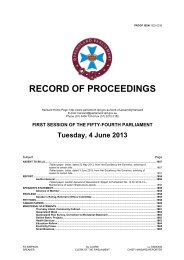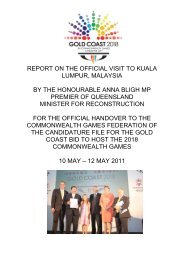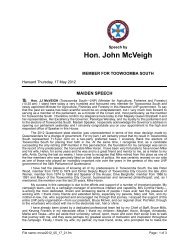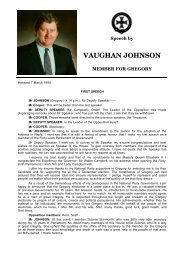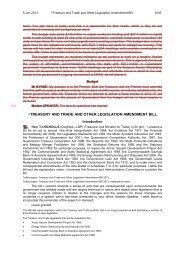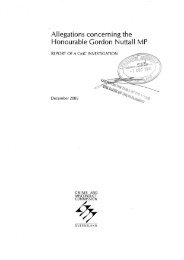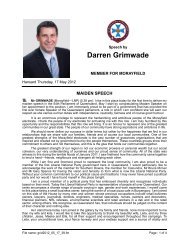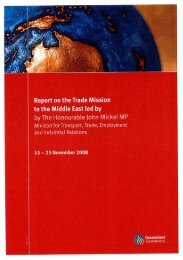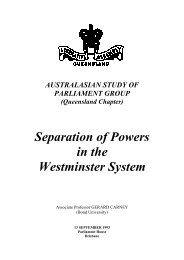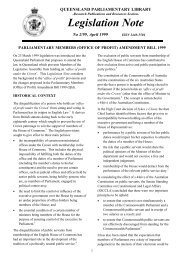weekly hansard - Queensland Parliament - Queensland Government
weekly hansard - Queensland Parliament - Queensland Government
weekly hansard - Queensland Parliament - Queensland Government
You also want an ePaper? Increase the reach of your titles
YUMPU automatically turns print PDFs into web optimized ePapers that Google loves.
23 Aug 2005 Plumbing and Drainage and Other Legislation Amendment Bill 2617<br />
non-contact playing fields. So there has been, and for a long time as far as Calliope is concerned, no<br />
discharge to the waterways and for the last couple of years no discharge in Gladstone in terms of<br />
treated waste. The ultimate beneficiary is the community and, importantly, the environment.<br />
It is welcome that the minister has given the right of veto to local governments. I think everyone<br />
here like me who has been a local councillor at some time has felt the pressure of legislation enacted<br />
outside of the council’s jurisdiction but pushed on to it, requiring the council to enforce the legislation<br />
often without financial support. This legislation is giving local councils the freedom to embrace the<br />
proposal or, if they are in an area that the councils feel is problematic—perhaps because of topography,<br />
soil types, demographics—they will have the freedom to refuse to accept applications for grey water<br />
usage. I would hope that most local councils treat this as a positive opportunity and that the majority of<br />
people who have the foresight and vision to recycle their grey water will receive favourable<br />
consideration by the local council involved.<br />
The minister stated that all grey water systems will require council approval and councils will be<br />
able to refuse approval for premises where land is considered unsuitable. Approved systems will need<br />
to comply with the <strong>Queensland</strong> Plumbing and Wastewater Code and irrigation pipes will be required to<br />
be installed below surface level to avoid human contact. My concern would be that those systems that<br />
will be approved are cost effective. It would be a tragedy to see a wonderful principle lost to cost. With<br />
the flexibility of using polypipe as an irrigation mechanism, it should not be too expensive. That is one<br />
issue that I would reiterate not only to state government but also to local councils, that in implementing<br />
the legislation they do not price it out of the reach of many landowners who would be very interested in<br />
being involved in this type of water reuse.<br />
The exclusion of kitchen grey water is probably something that can be argued as a positive or a<br />
negative. Certainly, it is important if people are going to reuse kitchen grey water to incorporate grease<br />
traps and the like. However, as a first step, it is probably a wise move to take it slowly and use grey<br />
water from areas where the contaminants are likely to be less—grey water from showers, washing<br />
laundry and those sorts of areas where the contaminants can be controlled by the users, the domestic<br />
home owners, in terms of the types of washing powders, soaps and detergents that they use in their<br />
bathrooms and laundries. But it would be important to reserve the use of kitchen grey water as an option<br />
for future consideration, particularly when there is technology to extract grease in perhaps less dense<br />
urban areas.<br />
I remember at a local government council conference we were talking about the recycling of grey<br />
water. A concern that comes up at all levels of government but particularly in local government is where<br />
a landowner knowingly or unknowingly lacks consideration for his or her neighbour. There could be<br />
problems with houses built on slopes where the neighbour can be the recipient of water flowing from<br />
other premises. The council’s involvement in that area is important. The fact that this first stage excludes<br />
kitchen grey water is important so that we can see how the community responds and perhaps, as I said,<br />
kitchen grey water will be an option in the future.<br />
I commend the minister for this step. I believe that as a community we can only be advantaged by<br />
it because recycling of such an important commodity will allow our communities to be a little more<br />
drought-proofed in years to come when we have been promised that rain will become even less<br />
common. I commend the bill to the House.<br />
Mr FENLON (Greenslopes—ALP) (5.47 pm): I rise to speak in support of the Plumbing and<br />
Drainage and Other Legislation Amendment Bill. Australia is perhaps the driest continent on earth, and<br />
we as a Western advanced civilisation live here. We are seeing more and more the results of the<br />
exigencies of dry cycles and long weather cycles the longer we live on this continent. Indeed, we live on<br />
a continent that was magnificently looked after prior to white settlement. We come now with a very<br />
different approach and with its own fallout in many ways as we use the magnificent resources of this<br />
country.<br />
We are increasingly conscious as a society, as a community, of these realities, especially as we<br />
see the water levels in our dams go down. I know by the number of constituents who readily wish to<br />
speak to me regarding their concerns about water that this is a very, very significant issue for people in<br />
the wider community. People are genuinely concerned about our future on this planet, especially as we<br />
live long term with our families in the south-east corner of <strong>Queensland</strong> and, indeed, throughout the rest<br />
of the <strong>Queensland</strong>. People are increasingly concerned about the use of our resources overall, but water<br />
is certainly foremost in people’s minds.<br />
This is an important piece of legislation in terms of trying to ensure that water resources are<br />
conserved. It is legislation that is premised upon perhaps that water going through the general<br />
sewerage system and being discharged as waste. That is an interesting premise in itself which might<br />
presuppose that using this water in a different way in our backyards is a better alternative.<br />
Therefore, in future when considering the licensing of systems in backyards it is important and<br />
very incumbent upon councils to consider a very fundamental point. Would those water resources be<br />
better processed at the outlet of the entire sewerage system and used in a constructive way, as we have<br />
heard the member for Thuringowa talk about previously? I have taken a great interest in the scheme



